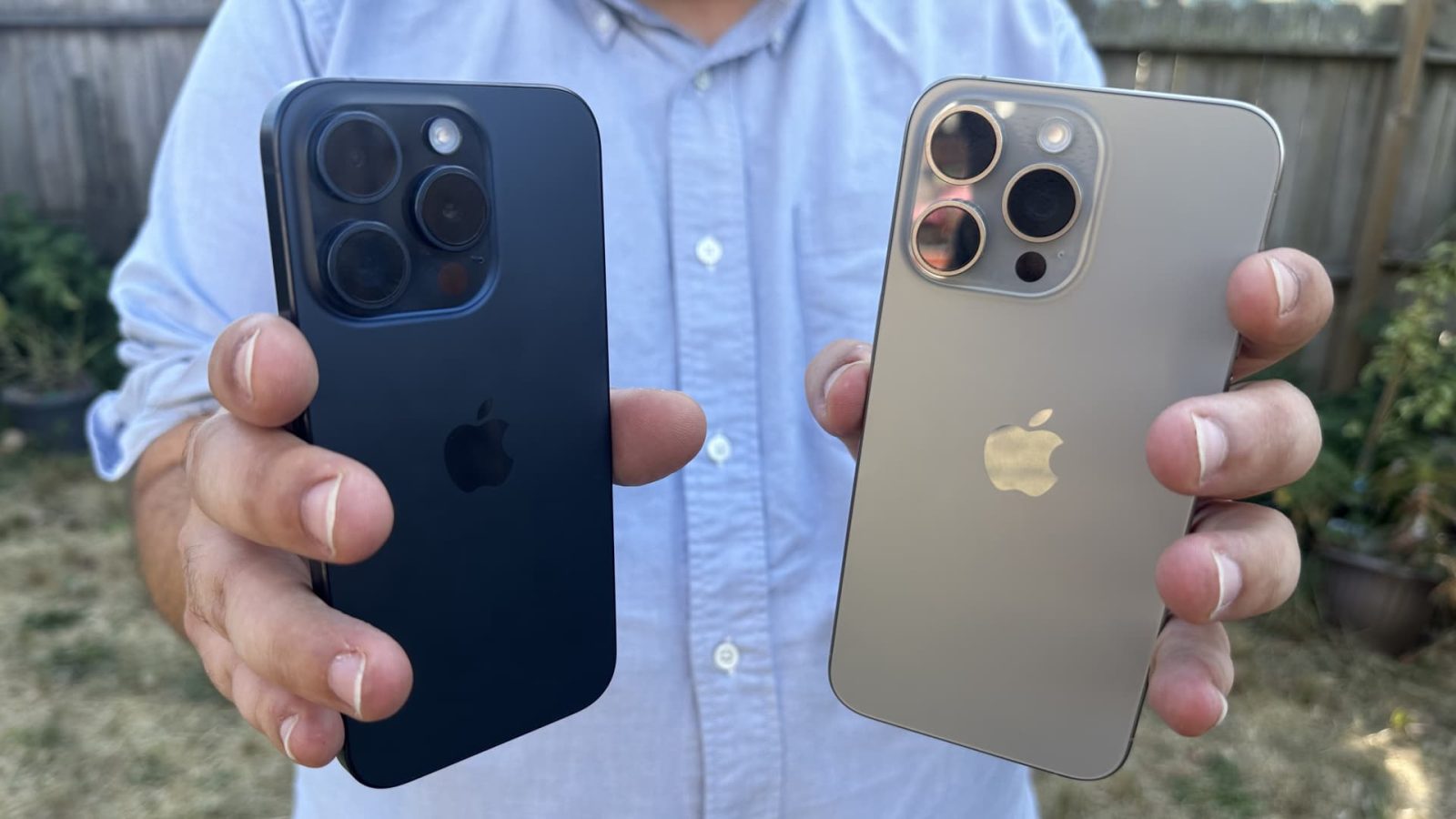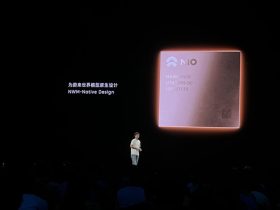I’ve been testing Apple’s two new Pro iPhones for the past several days. They hit store shelves on Friday.
The two Pro iPhones are significant year-over-year upgrades, with improvements to the camera, an improved physical body, and a new button. Most important for me, the high-end models are much lighter in weight and really make a big difference during daily use. I’d recommend them to any iPhone user who’s ready to upgrade, or anyone who has complained about how big and heavy smartphones have gotten.
They’re not cheap.
The 6.1-inch iPhone Pro model starts at $999 for 128GB of storage and goes up to $1499 for 1TB. I’d recommend the $1099 model with 256GB of storage for most people. The bigger phone, the 6.7-inch iPhone Pro Max, now starts at $1199, $100 more than last year, but the entry-level model has 256GB of storage and maxes out at 1TB for $1599.
In addition to the Pro models, Apple also offers two cheaper options, the iPhone 15 and iPhone 15 Plus, which cost $799 and $899 and up. They have the chip from last year’s iPhone 14 Pro, some camera improvements, and Apple’s “dynamic island” that hides the front-facing cameras. Most people will be perfectly happy with the mainstream iPhone 15 models, which are close to state-of-the-art.
But Apple’s Pro phones have the newest chip, the A17 Pro, a zoom lens, and a display with a faster refresh rate. For people who are picky about their personal technology, the pro models are significantly more desirable than the mainstream models, and their improvements often trickle down Apple’s lineup in the coming years.
Here’s what’s new and exciting about the iPhone 15 Pro phones:
What’s good
This year’s Pro iPhones have one visible and welcome change: They use titanium for the exterior frame, instead of stainless steel.
One color, “natural titanium,” shows off the new metal, but withmost other colors, it isn’t as immediately noticeable. But while the iPhone 15 Pro might look the same as last year’s model from a distance, it’s actually the biggest change to the iPhone’s exterior in years.
Titanium is a huge upgrade for daily use because it makes the phone lighter. It feels better in the hand. Apple’s Pro phones have been getting heavier since 2019, but this phone reverses the trend.
Apple says that the 6-inch iPhone 15 Pro is 187 grams, or 9% lighter than last year’s model. The iPhone 15 Pro Max, with a bigger 6.7-inch screen, weighs 8% less. But in practice, it feels like an even bigger reduction. Going back to my old iPhone 14 Pro, it feels like a brick. The weight difference between this year’s Pros and last year’s is noticeable even with a case.
Not only are this year’s Pro phones lighter, but they are also slightly narrower and shorter in length, although they’re marginally thicker than last year’s devices. They have a smaller border (bezel) around the same-sized screen, and it’s noticeable when holding the two devices side-by-side. But this also means last year’s cases won’t work with this year’s phones.
The weight difference is subtle but will be meaningful to many people, making daily use more delightful — and marathon TikTok and YouTube sessions less tiring.
I used the iPhone 15 Pro without a case, and it didn’t feel particularly fragile. But phones drop and break, and the new frame comes with one additional benefit: Significantly cheaper repairs. If the back glass on the iPhone 15 shatters, Apple is charging either $169 or $199 for a replacement, depending on screen size. On the iPhone 14 Pros, that price was either $499 or $549. Apple says it’s because this model is much easier to repair.
Zoom lens
Apple has also improved the zoom camera on the iPhone 15 Pro Max.
While the smaller phone still has a 3x zoom, the bigger phone now comes with a 5x zoom lens that mimics some of the better physical zoom lenses on standalone cameras that can be as long as 10 inches. Basically, the new iPhone allows you to get closer to your subject without physically getting closer.
It also comes with a nifty new kind of three-dimensional image stabilization that prevents the zoom shots from getting blurry, which is a problem with actual big zoom lenses. The handheld zoom shots on the iPhone 15 Pro Max were pretty sharp and clear.
The new lens will be very useful for day-to-day usage, as it makes more of the world around you easier to photograph. Parents will use it for kids’ sports, outdoors enthusiasts will use it take photos of birds and wildlife, and tourists will use it to get better vacation shots.
It’s also a reason to reach for the bigger iPhone 15 Pro Max over the cheaper but lighter and smaller iPhone 15 Pro.
USB-C
Apple’s iPhones have a new charger for the first time in a decade. Meet the USB-C port.
Apple’s change was prompted by European regulation, and will make being an iPhone owner a little more convenient, because you’ll be able to share your iPhone cord with laptops, headphones, iPads, and other newer gadgets. You can use a laptop charger to charge the iPhone, or use your iPhone’s charger to fill up your headphones.
The port change on the iPhone Pros also opens up some cool new abilities. For example, if you have a USB-C monitor dock, like many corporate workers do, you can now likely plug your phone into a monitor, which mirrors what’s on your phone screen, for presentations, or perhaps to watch a movie or play a game. That was possible before, with a dongle, but now anyone with a new iPhone and recent monitor dock can do it.
You can also now use a powered-up iPhone to charge other gadgets, such as AirPods or Apple Watch, or even another iPhone, using a cord coming from its USB-C port. They don’t charge fast, but it works.
USB-C is a great improvement, although it won’t be immediately smooth for a lot of people. For example, the cord in my car for Apple CarPlay is currently using Lightning, the old connector, and not everyone in my family is upgrading to the new phones. I’ll have to use a dongle for a while.
Action button
The other big physical change to the iPhones this year is the Action button, which replaces the mute-switch.
The button is surprisingly nice, and I can see a lot of people using it every single day. Most people leave their phones on mute all the time, and there are several ways to mute or unmute your phone through software settings.
The new button provides haptic feedback when it’s pressed, and Apple has provided several convenient ways to use it.
My personal favorite is as a camera button. Press it quickly, and it brings up the camera. Press it again, and it takes a photo. If you hold it down, it takes a video.
Another interesting application is to quickly bring up a translation app that can take your spoken words and turn it into one of several foreign languages, and it translates responses as well.
The button is also customizable through Apple’s iPhone macro program called Shortcuts, which means people will come up with a number of creative uses once it’s released to the public.
Nice to have
New portrait features
Other camera improvements include the ability to change focus in many photos after they’re taken. It’s part of the ability to use “Portrait Mode” without specifically taking a Portrait Mode photo. Any photo taken with the iPhone 15 Pro’s camera that either has a manual focus (tapping the screen) or has a human or pet in the frame will automatically capture the depth information needed to tweak the photo after-the-fact.
Photos with Apple’s depth data can do lots of stuff, like changing the focus in the image, or Portrait Mode, which can vignette the background or give a softer focus to the subject. Photos with Apple’s depth mdata are marked in the camera roll with a stylized “f” symbol.
Apple’s main camera on the Pros also takes 24 megapixel photos, combining a larger 48-megapixel image with a smaller 12-megapixel image to synthesize a new photo with better range of light and additional details. It’s a subtle improvement but comforting if you shoot a lot of photos and just want them all to be good.
A17 chip
The iPhone Pros get the A17 Pro chip, the latest and greatest Apple silicon, as compared to the mainstream iPhone 15s, which have last year’s Pro model A16 Bionic chip.
In day-to-day use, you won’t notice the difference, because the iPhone is generally snappy. But Apple says the chip has a new 6-core GPU design that can handle “ray tracing,” an advanced kind of graphics computation previously limited to high-end gaming cards that essentially simulates light. It’s also got a better “neural engine” for running artificial intelligence.
There aren’t ray-tracing enabled games available yet on Apple’s App Store, but there are console-level titles such as the forthcoming Resident Evil Village that will take advantage of the new chip.
For most people, having the latest chip means there’s another year at the end of the phone’s life when it’s likely to get updates.
Standby mode
One of the phone’s niftiest new features allows it to turn into a dashboard that displays real-time information, such as calendar appointments, photos, and even things like how close your pizza is to being delivered. This feature works with older phones, too, that have updated to the latest version of iOS, and requires a MagSafe charging stand. It’s going to be great for office workers.
Still some quirks
Heat
I only encountered a hot iPhone 15 Pro Max once, when playing the Apple Arcade title “Zookeeper World.” However, for about 5 minutes, the phone was too hot to hold, especially on the titanium frame, and I had to put it down. Heat issues haven’t cropped up since in my testing.
iPhone setup
Apple’s automatic iPhone transfer system has come a long way. When I got my review unit, all I had to do is sign in with my Apple ID, and hold my old phone next to the new one, and my texts, apps, photos and files all transferred. I’m an iCloud subscriber, but it was still pretty seamless.
But the process still isn’t perfect, and users should know it may take a day to make sure everything is transferred over. For example, my Apple Watch didn’t immediately transfer to pairing with the new phone — and I had to be careful, because I had a farecard on my Watch with a significant amount of money on it, and if I wasn’t careful about how I transferred it, I might have lost it. A few health settings didn’t immediately sync either, and required my attention to sort out.
Conclusion
The iPhone 15 Pros are one of the best upgrades in many years for Apple’s high-end phones, although the core of what an iPhone does hasn’t changed at all. Any of Apple’s phones currently on sale — which include 2022 and 2021 models at discounts — can make calls, send texts, download apps, and take great photographs. If you’re upgrading after a few years, all of Apple’s phones are big improvements, and they’ll all get the job done.
But there are also people who know they use their phone for hours per day. In fact, Apple’s Screen Time feature often reminds them of just how much time each week they spend on their iPhone.
For these people, even if they have last year’s phone, it’s worth going to an Apple Store or Best Buy, picking up the new Pro devices, and seeing if they like the decreased weight and new balance. I think the lighter, more wieldable phone is a major improvement in the phone’s physical form, even if it looks largely the same as last year’s models.
The other question is whether to pay the extra $200 to get the Pro Max when it’s got the same chip and main features as the $999 iPhone 15 Pro. The Pro Max is still a big phone with a 6.7-inch screen, but it’s much lighter this year, and the 5x zoom is a significant feature and something worth getting for people who take a lot of photos, like parents or photographers.
Read the full article here












Leave a Reply